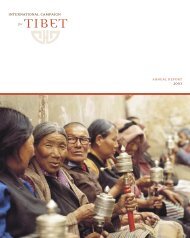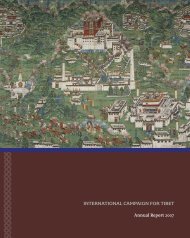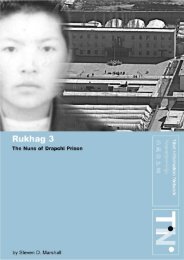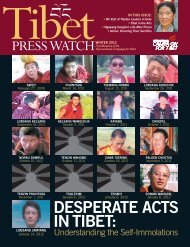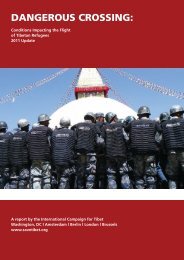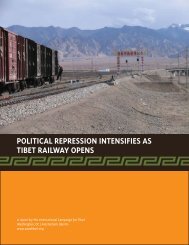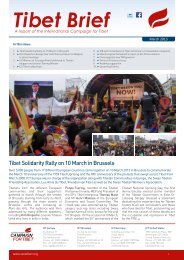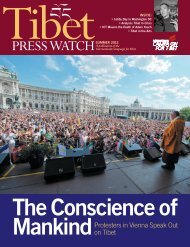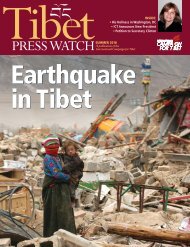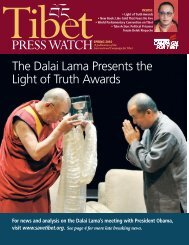download the report - International Campaign for Tibet
download the report - International Campaign for Tibet
download the report - International Campaign for Tibet
You also want an ePaper? Increase the reach of your titles
YUMPU automatically turns print PDFs into web optimized ePapers that Google loves.
TIBET AT A TURNING POINT: THE SPRING UPRISING AND CHINA’S NEW CRACKDOWN<br />
‘Those injured had no choice but to wait <strong>for</strong> death’<br />
This account was given to <strong>the</strong> <strong>Tibet</strong>an language section of Radio Free Asia<br />
on April 14 by an unnamed <strong>Tibet</strong>an caller (www.rfa.org).<br />
“It is very difficult to give an exact number of people who were killed. One of <strong>the</strong><br />
main reasons is that many were killed in <strong>the</strong> area of <strong>the</strong> Jokhang, and many of <strong>the</strong>se<br />
had come from <strong>the</strong> Kham and Amdo regions to Lhasa <strong>for</strong> different reasons. Most of<br />
<strong>the</strong>m did not have residence permits. There<strong>for</strong>e, because of a lack of documentation,<br />
<strong>the</strong>re is no way to verify who was killed. Over 100 <strong>Tibet</strong>ans were killed. Many of my<br />
friends saw <strong>Tibet</strong>ans being killed.<br />
“In <strong>the</strong> beginning, many injured <strong>Tibet</strong>an protestors were taken to Chinese hospitals,<br />
where <strong>the</strong>y were treated. Later, when injured <strong>Tibet</strong>ans were taken to hospitals, <strong>the</strong>y<br />
were detained instead of receiving medical attention. In fact, on <strong>the</strong> second day of <strong>the</strong><br />
protests, even <strong>Tibet</strong>ans who had bruises were treated as suspects and detained. So<br />
<strong>Tibet</strong>ans who were injured had no choice but to wait <strong>for</strong> death.<br />
[ICT has received similar <strong>report</strong>s, indicating that some <strong>Tibet</strong>ans may have died due to<br />
lack of access to medical treatment. In some cases, individuals with medical knowledge<br />
provided emergency first aid and tended to <strong>the</strong> wounded but it was generally<br />
not regarded as safe to go to government-run hospitals.]<br />
“Now, <strong>the</strong> situation <strong>for</strong> <strong>Tibet</strong>ans in Lhasa is very tense. If a <strong>Tibet</strong>an argues over prices<br />
with a Chinese grocery-shop owner, <strong>the</strong> shop owner calls <strong>the</strong> police and <strong>the</strong> <strong>Tibet</strong>an<br />
is detained as a suspect. Any <strong>Tibet</strong>an without a residence permit is also detained. Even<br />
elderly <strong>Tibet</strong>ans who cannot walk straight and <strong>Tibet</strong>an schoolchildren are searched.<br />
The Han Chinese don’t need residence permits. Their spoken Mandarin language is itself<br />
<strong>the</strong>ir permit.”<br />
Loss of life in Lhasa and <strong>the</strong> removal of monks from monasteries<br />
This account from a <strong>Tibet</strong>an woman who was eyewitness to events in Lhasa in<br />
March, and who spoke to o<strong>the</strong>rs who witnessed events, was given to ICT on<br />
her arrival in exile.<br />
“I was in Lhasa earlier this year when protests broke out. I wanted to <strong>report</strong> what I saw<br />
and heard when I was <strong>the</strong>re as accurately as possible. This in<strong>for</strong>mation was relayed to<br />
58



